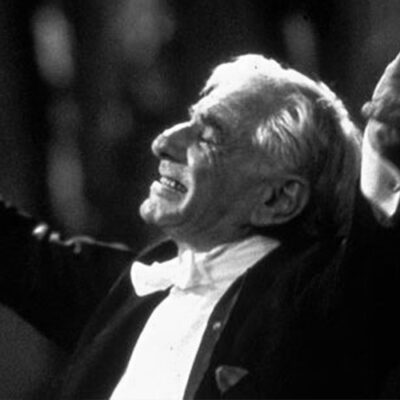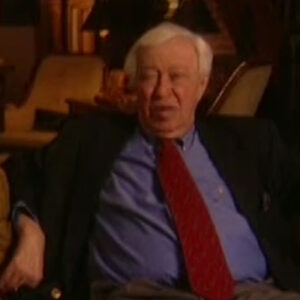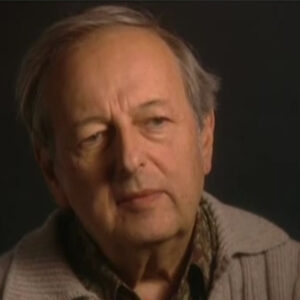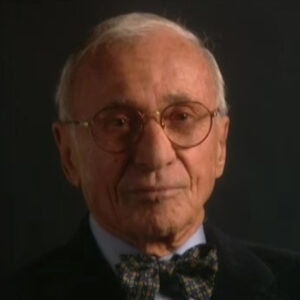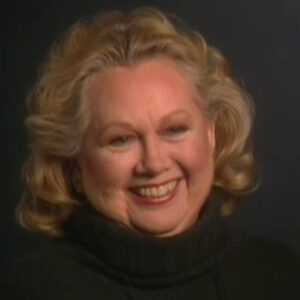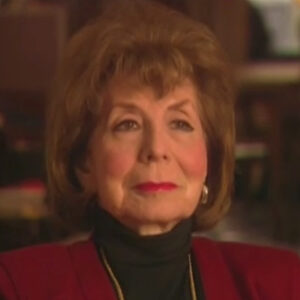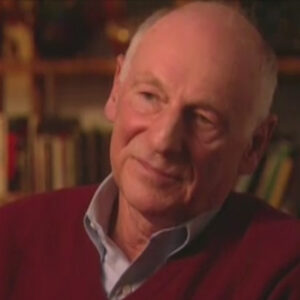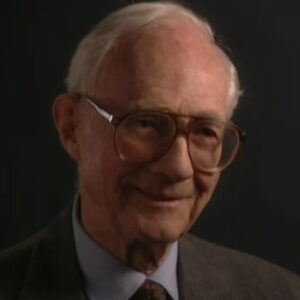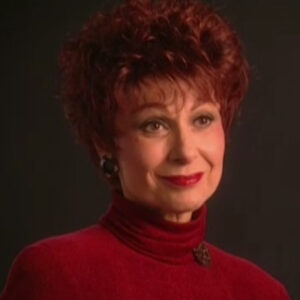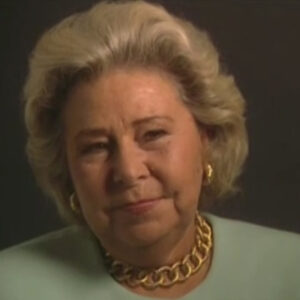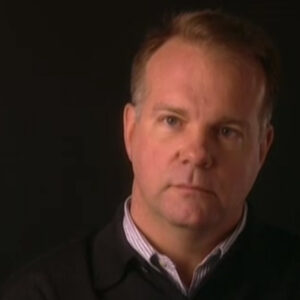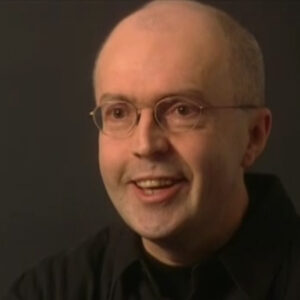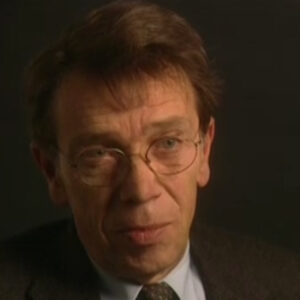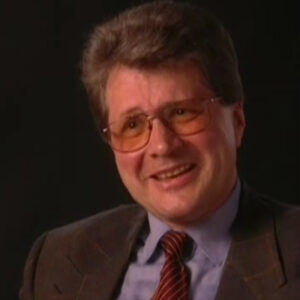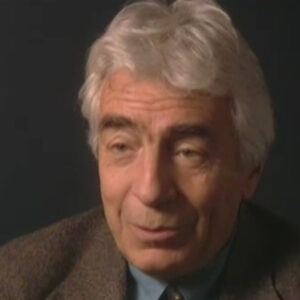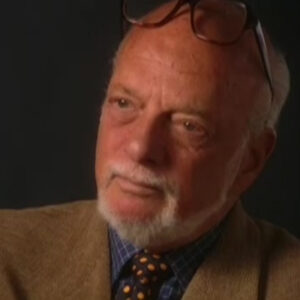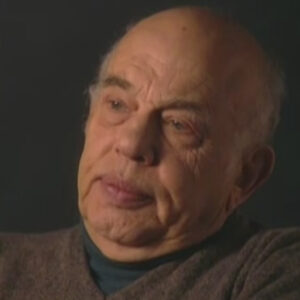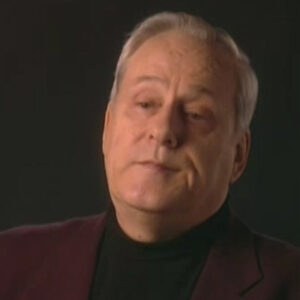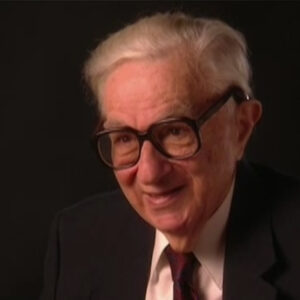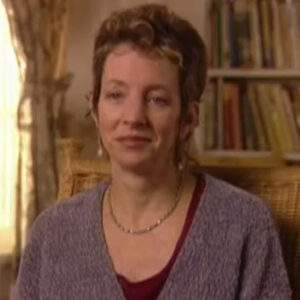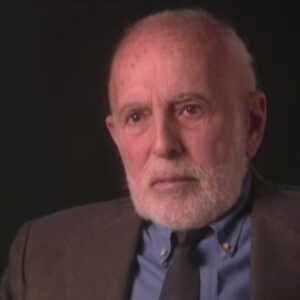Speaker I think I’ve been curious about do you think that being the only son in any way changed your experience of being a child with words like.
Speaker I probably it being the only son, I suppose, first of all, coming from a Jewish father, there’s a lot of stock in the boy child and and I think he took that pretty seriously. And it worked out as a sort of evening, evening thing with Jamie because she got a lot of perks being the first born and as a second born, I got perks for being a boy. So that helped me out in that in that department. Explain to explain that for somebody, you may not know what you mean when you talk about the well being the son of a Jewish father and in Judaism and especially in the more traditional households which my father came from. Women are relegated to not only in the synagogue to sitting upstairs and away from all the men, but not joining in any sort of discussions of the world, of politics, of anything concerning the life of men. And and as liberal and worldly and assimilated and reformed as my father was once he left his his home. I think he still carried some of that with him.
Speaker And and perhaps I got more attention as someone to talk seriously about politics or religion than perhaps my sisters did, which is sort of unfair.
Speaker But I’ll take we’ve talked about this, so don’t I hope you know that you can ask him to repeat yourself.
Speaker But in this context, as well as having the context of options here of the role, and I don’t mean for a moment when it gets very clear from a lot of things that learned was religious with a small or Catholic, I’m not sure which, but that it was a it was about spirituality, that spiritual quest in his life and not a particular religion, but was how much of a factor in your in your relationship parent and child did? This question is why?
Speaker Um.
Speaker Well, I suppose, ironically enough, it was the actual capital or religious part that that brought us together more than any sort of spiritual part.
Speaker It was with him that I would go to the synagogue on Yom Kippur, high holidays, I was sort of second or third in command man wise at Passover.
Speaker So it was the the actual organized religion part that that brought us together more than any. Personal spiritual quest of his and I certainly never was a part of that, nor do I think were many people at all. It was very personal on his part and came through for anyone else, only through his music, I think. And the what programatic or dramatic context there was for his music, like in college or in mass.
Speaker He coached you for your part of it.
Speaker He sure did. He was describing the experience of learning that I had.
Speaker I was very fortunate to have not at first. I had a my own tutor who actually came to our house was very nice rabbi named Bob Grou Menken, who would come over on Wednesdays when I was 12 years old, and he would come and coach me and teach me the language and also the symbols for how to sing. The the Hebrew, and so he gave me all the groundwork, and then that summer we all went to Italy for the summer and my father spent some time coaching me and he had a much better time than I did, although I enjoyed it a lot. But I would probably have been happier swimming. But it was well, it was really nice. And it was it felt good just to be able to be doing something with him that was making him happy. And and he taught me tons. And as opposed to the way I was taught by Rabbi Grooming. And he actually, you know, put everything in context and related language to everything else, to other languages, to the history, to how it was related to Arabic, Aramaic, Sanskrit, you know, and it was fascinating. So not only did I get the, uh, the coaching in Hebrew and in the Bible, but I got history and political history and analysis of all of that a lot as a 12 year old. But, um, amazing. Just amazing. And I was constantly amazed at how much he knew how. First of all, how well he could speak Hebrew. And also when I would go to temple with him, how much of everything he knew, he knew, you know, the order of things and how to sing what, when. And it’s all very complicated. And, you know, when he was he would get called up to read from the Torah and he was able to do that in a second, and that always impressed me a great deal.
Speaker Do you ever talk about his own religious background and how that and how he connected and why he came to connect that?
Speaker I don’t know if he talked to me necessarily. I mean, it was always sort of part of the law. And I probably overheard him talking about it a lot, how much he had learned to love music through hearing music at the temple when he was growing up.
Speaker And.
Speaker The connection to I suppose there was. His favorite part of the Bible was the Psalms, I think, and if there was a motto in his in his life, I think it was make a joyful noise. And I think that was the greatest connection he had with religion.
Speaker You did he ever talk to you that tell you the story of. I think his first composition was it was inspired by the songs he heard Sam singing a shower, um, I’m sure it’s true.
Speaker I’d never heard that before. I mean, I just thought. Yeah. Singing Oh, yeah. I think he adored the sort of Hasidic songs that his father and his father’s friends sang, but I don’t know any of that firsthand. It’s only through, uh, reading about it or so. He didn’t talk about that much.
Speaker And you have your most intimate moments.
Speaker When I hear some here in Fairfield, um, it seems to me when I think about it that perhaps our most intimate moments were when we traveled together from when I was a very little boy to, um, years and years later, we traveled when I was maybe from eight. And sometimes he would take me to the Caribbean in the middle of the winter, which was the best, of course, and just hang out at the beach. And it was just very easy and fun and low pressure and playing chess on the beach and being stupid and and fun and talking about nothing. And to going in the early 70s, I suppose, when I was by then maybe 19. 1819 to the Far East and Australia, we spent a lot of time together, both on airplanes, hotels, all of that and. And staying up really late after concerts together, you know, there would be a big crowd at the hotel, that hotel room after a concert sold, everybody else disappears and we’re still sitting there drinking too much, you know, and happily chatting until whenever the sun coming up. And I just loved that. And it was such a joy to have, uh, just that time with him to it wasn’t actually what we were talking about. It was important to us. Just being with Daddy was just so wonderful. And occasionally that would happen here, but not that often because there was lots more family around and so on. So although there were a few years actually when. Jamie was living in California, this was maybe early 80s, late 70s. Jamie was living in California and Nina was in college. And I was pretty much the only one who came here. And my father would come on occasion and we had some opportunities to just hang out here, and that was well. Did you feel that you had the opportunity to have this kind of desire to feel that there was a yes.
Speaker In some ways it’s an obvious question, but I’m curious about the specifics of the differences between the public and the private land.
Speaker I. I think in comparison to anyone else that is famous. Where there’s always the difference between the public and the private person, he’s pretty much the closest of the people of anybody I know who is somewhat the same publicly and privately. And I don’t know if he was particularly conscious on his part, but but I just don’t think he cared much about it one way or the other. He was, uh. He was who he was and he actually sort of got off on being himself in public and shocking people and so on, and so I never got the sense that he was. Suddenly able to relax and let it out, you know, because it’s sort of always did, except when he was being interviewed on TV or when he was doing his young people’s concerts. And that was sort of a different public person and that was definitely different. That was his voice would change and he would talk very properly. And, you know, his he’d have a whole new demeanor and accent and so on. And that was sort of fun to watch. Uh, that’s what he sounded like.
Speaker All right.
Speaker Well, you said something like that. Now he started it. That’s very funny. I mean, he had a very malleable voice that when he traveled the world, his voice would sometimes change depending on where he was in the world when he was in Britain. He would start affecting the British accent, even on the plane, on the way there with the with the stewardesses. And in Germany, just because he was speaking a lot of German, when he would start speaking English, he would almost have a German accent, which was very funny. His voice would change wherever he was.
Speaker An extraordinary facility with languages.
Speaker Amazing. I was just astounded not. I suppose it it’s related to his musical facility. I’m sure he would have said so, but just like he would be able to listen to five new pop songs on the way here in the car and then play them all exactly right on the piano after hearing them the first time, he could pick up language very quickly. And he spoke six languages fluently, I think. And then he would go to Poland and within a week have a pretty good grasp of of the languages. One of those amazing things you can’t particularly explain. He just loved it. I mean, the only way you learn things is if you love him. And he just was had this passion for learning language is amazing.
Speaker So his memory and retentive ability seems to me to be so phenomenal. It’s beyond explanation. Was that something that people consciously talked about? I mean, did other, you know, other people who could do that to you?
Speaker Or the only other person I know who had something close to that is Adolph Green. And I think that’s why they were such fast friends to begin with. And they could remember. You know, entire symphonies or entire epic poems from your first words last, but it was just monstrous to me that he could do this, that he could remember, you know, the the entire works of Wordsworth and Keats and Lewis Carroll.
Speaker And he could, you know, and really dumb doggerel, poetry that he had heard in college and just have it at the drop of a hat.
Speaker And it’s just amazing. Amazing. And my memory is so bad.
Speaker That it makes it even more astounding for me that that he could do that.
Speaker Yeah, I can’t.
Speaker It’s beyond a kind of explanation. It seems to it’s really nice. Maybe you could say that because he was a conductor and he had to learn so many scores, he developed a memory that he had it himself before long before he was a conductor. Oh, absolutely. It was there. You what do you think?
Speaker Raising it off and off Adolf Hitler. I know.
Speaker I know. It’s very sensitive, but I have to providing myself with what I do. What would you characterize?
Speaker I suppose that’s why there’s so many people that one could very easily say, this is my father’s best friend. I as far as length of time is concerned. Absolutely.
Speaker But surely is his best friend. His sister. His brother Bertie is the best friend. My mother was his best friend Tommy. Catherine was his best friend. You know, it’s, uh, it’s very hard to.
Speaker To to single somebody out, but I’d say just just in terms of longevity, it would have to be a lot easier if I read someplace where you talked about your father’s studio, genius, mysterious, wonderful place for you as you were kind of young when you first began to do that.
Speaker Did your father’s studio describe that something of history with that?
Speaker Well, when he worked, um, you know, the door was closed, although you could always go in if you needed something or if there was a phone call for him or something, but. I never actually saw what he did when he was composing, when he was studying a score, you could sort of it would be boring, but you could watch him read the score and do his red and blue pencil stuff in the phrasing. And sometimes he would explain it. But when he composed, he would either just be lying. Down on the couch. Or he would be springing up and going to the piano, writing madly on the score sheet music, and that was an incredible mystery. What actually happened when you’re a kid to to watch that? You have no idea what this man is doing for a living. And all your friends at school have explanations for their father’s work. And he goes to the office and he comes home and he’s a lawyer. The doctor, my father lies on a couch and gets up and sit at the piano and writes stuff on a piece of paper. And you just, you know, it was rather mysterious.
Speaker What was his best composing mode? What was his favorite position?
Speaker Oh, well, according to him, it was on his back and he would get in the sort of half. Half asleep state and something would jump up and go to the piano and I don’t know anything otherwise, but I imagine that was that he would get a very simple idea. And then when he would start playing at the piano and he would it would just take off from there. I’m sure he spent a lot more time actually at the piano than on the couch. It wasn’t as though he was lying on the couch. And suddenly, you know, the fugue from cool was fully formed in his mind and wrote it down, but.
Speaker Something would come on the couch. Is that one of your favorite words?
Speaker Yes, probably my favorite. The view from Google is probably my favorite piece of, uh. I don’t know if I would go so far as to say that, but one of my favorite pieces of his is the fugue from cool from a side story, because I think it’s hard to say. It’s just so much fun to listen to. And it goes so many places and it’s thrilling and it goes on and on and on and even better to watch it danced. And it’s really complicated. But you can also understand it.
Speaker And that’s what I love about it.
Speaker I’m just having it in my ba ba ba dum dum.
Speaker And you can sort of follow it all the way through.
Speaker It’s just wonderful, really is an extraordinary work story. So what kind of music did you listen to when you were home and you were family and you put music on? What did your father play? Right.
Speaker Well, that didn’t happen a lot, what occasionally he would come home with a test pressing the recording or the new spanking new recording with a beautiful cover that had just come out and he would play that or a friend of his would have a new piece of music out that we would play. But it wasn’t as though we would ever sit around and just put on chamber music or symphonies, particularly if they were connected by anybody else or or show tunes with.
Speaker Jamie and I were just talking before about how amazingly we never played Broadway shows in our house. And when both of us when we went to college and our friends were so amazed that we didn’t know Carousel, we didn’t know Finian’s Rainbow, we didn’t know Standard Oklahoma, you know, and we know sort of of them and a couple of tunes from them. But we didn’t have the records in our house. We had My Fair Lady You house and it was just not part of our life that we would listen to the Broadway shows or listen to much music at all. What we heard was both our parents playing stuff on the piano and we all sang a lot. And when we were obviously when we were little kids, we had a lot of kiddie records, but it was we sang oh goodness a lot. Well, you know, that was the yearly Christmas carols. There was singing lots at Passover every time the family was together. And we’d all be around me. And then there’s sort of old family songs, dopey things, and just sometimes, let’s see, there was a song Jamie and I used to sing called No Nobbys, which was always a big hit.
Speaker But it was not exactly, you know, seeing my bill whenever Secretary Jerome Kern, Gershwin.
Speaker Not a lot. I mean, it was around, I guess, you know, it would be later on. Actually, there was a lot of that. And probably after when we were kids, after we went to bed, there was a lot of the grownups sitting around singing that we didn’t really grow up learning those songs because he knew everything. Oh, of course. Yeah. And when, you know, Adolf and Betty were around Phyllis and there would be a lot of singing of all the songs, they knew reviewer’s songs.
Speaker And so you ever talk about Gershwin?
Speaker Uh, no, not particularly.
Speaker Although, uh, I had my, uh, actually, you asked me when I was proud of him.
Speaker Proudest of him. Last night.
Speaker And it occurs to me now that. Another time I was proudest of him, we were in Jamaica, it was about eight months after my mother had died and it was the first time that he had sort of come out of his very, very deep depression and he was finally feeling a little better. And we were in this wonderful hotel called Roundhill, and it was late at night after dinner. And we all went down to the bar on the beach and there were a few people in there and he would just hang around and he went over to the piano, cleared the stage out and played Rhapsody in Blue from beginning to end. And it was the best performance of that I had ever, ever heard and probably anybody in there and I was weeping, I just couldn’t get over it. And it was like he was back, you know, and and also felt so lucky to have a performance like that of that piece. It was an amazing moment.
Speaker What are some of your traveling I know you traveled with Lenegan.
Speaker What are some of the high points that you know, that you can remember in terms of your sense of how people abroad felt about.
Speaker Um. Oh, my goodness.
Speaker Well, I’ll just take you through, for instance, a sort of blow by blow with the arriving scene in Japan, we arrive in Japan.
Speaker There’s a press conference at the airport. There’s a bottle of Ballantine’s waiting for him at the counter. You know where the microphones are packed press conference. And I’ve never seen anything like this before, even, you know, traveling with him before, years earlier, but it hadn’t been for a while. This was when he was suddenly becoming an international figure.
Speaker And sort of escort to the hotel, the top floor of whatever it is, the Imperial Palace Hotel in Tokyo, and all these rooms and people rushing back and forth, and it was really it was just suddenly this regal business going on and it was just shocking. And a lot of fun and and a lot of attention and so on. And at that time, this was 73. I think that time he was still of a certain humor about it and thought it was all the big fun thing to do. And it was just, you know, Joy to be around and everybody from the porters to the everybody, the maids and his assistants and the press people and all of that, just everybody was having a grand old time. And. And then, you know, you go to the hall and there’s just always the blob of people following him around. And you get to the hall and there’s people waiting for him. And then after the concert, of course, the concert being hit, everybody’s going crazy, wild ovations. And then I remember in Tokyo, he said after the concert for I think two and a half hours signing autographs and and not just autographs people, you know, they would obviously breaking records for him to sign, but they would also bring these beautiful parchment things they had prepared for him to sign or Courreges, you know, the great Japanese paper with poetry on it. And each one, of course, had a story to talk to him about, and he would spend time with everybody listening to their story. Just amazing. And so, you know, that sort of as the traveling companion, that’s where you sort of pay your dues. You stand there politely for a couple of hours while he does this. But also you just kind of awestruck and impressed that he’s willing to do this and really get to know about 3000 people in a matter of a few hours. And then he sees that he said, OK, let’s go get something to eat or have you know, you come. You can. You can. You can. He’s already made five new friends and we all get in various cars and things and go by now it’s 1:00 in the morning. It was just amazing. And it would be the word it was a real.
Speaker I describe that. I haven’t asked anybody else. Thank you, ladies.
Speaker Consequentialist. You just I don’t know. But you were there a lot. Well, there was stuff in the Pentagon. Well, he as he was getting dressed at home, I would go visit him in our household. Bathrooms were not particularly sacred place. People came in and out all the time. And and so, you know, you go and he’d be in the bathroom. So chat. So anyway, so he’d be getting ready and I would find a couple of pennies depending on how many pieces he was doing that night.
Speaker And this is a routine, I believe, that my Uncle Bert started, uh, way, way back and I sort of took on. And so if there were if he was doing three pieces, let’s say he was doing, you know, Haydn and Haydn Symphony and something short by Piston and then Mahler’s Symphony. And so he would have three pennies. And so I would always kiss the Lincoln side first and then the other side, and then he’d do the same and then he’d put it in one pocket. That was for Haydn and that’s for pissants for Mahler. And so he’d sort of go every. To his concert every night with the pianist, whether we were going along or not. And so that was always a nice little ritual.
Speaker Then he would, of course, wear koussevitzky cufflinks.
Speaker For every concert he ever gave up and he would kiss them before, just before he went out on stage. And other rituals, did he have he had a the Maltese cross, which I think was my mother gave him hope that.
Speaker And not that he was particularly superstitious, me, but I know he he he he did the. And he would just the score, although I never knew that to be original. I mean, I saw him do it, but I never thought of it as a ritual. This is just like this. But we do this every country, every single concert, he would he would do that. He would go through every part of the ritual, although I mean, obviously there were many concerts, I wasn’t a part of that. He didn’t get prepared, but he managed somehow to pull off. I don’t know that. I mean, it was when I was able to be around I mean, when there were concerts, you know, when he was traveling, I wasn’t there when I wasn’t in New York and he had concert and that nobody could call me because I have come to ask him too much is he reminded me of it.
Speaker Your mother was a very accomplished pianist as well. Indeed, she had studied. My mother had studied growing up in Chile and a great deal and was actually an aspiring pianist for many years. And I believe the story goes that that is how she talked her way out of Chile to her parents and to New York was to say she was going to be studying the piano to be to become a professional musician when in fact her dream was to act, which would have been unheard of to go to the family in Chile. Did they do 400 piano? Yes, very often early. And when we lived on 57 Street at the Ausborn and we lived there till I was, I think, five, I remember them playing a lot of foreign music together. And, uh, and it was just wonderful to listen to. And also remember when we first moved here, she used to play and play the piano in here quite a bit. And she had her couple of pieces for sure. When we first moved to Fairfield, I remember her playing the piano a good deal and and she had her few Schubert pieces and Brahms pieces. It just gave us such pleasure. And there was no I mean, but there was Schubert Intermezzo. I remember. There was. Cause and and after she just would get so frustrated with it, and I guess she just wasn’t better than she hoped she would be, and she really kind of stopped playing after one.
Speaker Oh, it’s a big shame that she did and it was a sort of a bad example for us, we could say, well, I don’t want to play the piano either. Um.
Speaker I just talk a little bit about what we’re talking about and they’re letting sports, I mean, he was a sportsman.
Speaker I mean, everybody is talking about this, that wherever he went.
Speaker You know, when people around horses across the plains ride horses across the plains and mean that he had this need to express himself physically as well, but then he wasn’t really you know, he was no, he was not a very gifted athlete.
Speaker He was a very enthusiastic athlete. It’s I equate it to his driving. He was a terrible driver, but a very enthusiastic one. And that’s how he played tennis and skied. I mean, he was a menace on the ski slopes. But he adored it, he had such a great time and every time we went, he was so finally now I’ve discovered how to do it. I know now it’s all rhythmic. And and he would plow the pole into the snow, you know, tumble about 50 feet. Now I really get it. So it’s there’s an uptick. And it was hopeless, but he loved it and he could get down any slope and he was, you know, fine skier. And and a fine tennis player, although we didn’t play much, I beat him. Uh, finally when I was about 13 and we didn’t play much after that, I was very much after I’d been.
Speaker And are there any other stories? I Congressman think I’m not sure somebody would have told us about. He is talking about writing The Arab Stallion.
Speaker They are back across the plains or something like that. You know, I missed that one. Was that when he was ranching with.
Speaker No, I have no idea. Were there other sort of stories that you could hear over and over again about, you know, exploits dramatic physical and dramatic physical exploits, I guess, sailing?
Speaker There was his dramatic sailing event with Jamie, where they were in the storm in Martha’s Vineyard and somehow got back.
Speaker But this turns out it was just the lagoon and they were like 50 feet away.
Speaker But I had grown up thinking that it was this incredible miraculous feat of great sailing prowess.
Speaker No, he but he was just determined, I think, to try everything one time. And luckily, he never did really dangerous things. If he had been asked. I’m sure he would have done rock climbing. He would have parachuted. He would have.
Speaker But he managed to avoid that stuff.
Speaker Do you know the story that is taking over the wheel of the airplane over the Andes? I don’t think I want to hear that. He did talk about that. But anyway, when I was with which is really amazing.
Speaker What was it like to spend so much time as a child with your father on tour? Very often you love.
Speaker Do you think affect you? I have no idea how it affected me.
Speaker I mean, I’ve tried to think about it and it’s just hard to know what it would have been otherwise. But I think our house hold was stabilized by the presence of Hoodia Vega, who was our sort of nanny housekeeper since before I was born. And so life in the house was always the same as long as Julia was there, whether my parents were there or not. So it wasn’t that different.
Speaker It was just I mean, there was you know, all the daily activities were the same, um. I suppose it made me depend more on Julia as a consistent force in my life than my parents, and so they took on different roles in my life, more so my father than my mother, because my mother was around them more, but.
Speaker But I don’t think it made it a whole lot of difference in my life, I really don’t.
Speaker And the clearly you had a lot of fun in your.
Speaker Very fun life, but there were also some difficult times, yeah, there were. Is it hard for you to talk about this? Oh, no.
Speaker There any in particular? Well, I mean, I believe.
Speaker And most particularly interested in knowing about how the difficult times, if you has been, to be more specific, that affected him as an artist and as a musician and as a creator, then, you know, because I spoke with Lenny, those things are so tied up together that, of course, of course.
Speaker And very chicken and egg and very chicken and egg also because you don’t know whether one is feeding the other chicken egg creativity.
Speaker And what then?
Speaker Yeah, I’d love to talk about that, except I’m very bad on dates.
Speaker And when he was writing something and what was going on in his life at the time. So if you want to ask me about specific times and events and people, maybe that’s easier.
Speaker Well, why don’t you talk about generally I mean, and and then a specific thing will come to you. But what the connection was between Lenny’s life and his emotional life and his creative life. Hmm.
Speaker I guess I’m having such a problem answering this because. There was. There was no I never had a sense of his creative life.
Speaker As a as a parallel thing with his emotional life as though they were somehow separated and then having like railroad ties sometimes.
Speaker I really have no idea how to answer the question. It’s funny. Well, there was terms of things that I think probably created most dips, from what I can gather, are. This is Dan. And their reaction to a couple of big pieces is invested in. Having trouble being taken seriously by some of the critics in general, but, yeah, I mean, I know what you’re getting at, but I just I. There is no way that I can even surmise how any of those things affected his creative life.
Speaker For instance, I mean, it would be it would be easy for me to say that the assassination of JFK and also that year, the death of Mark Blitzstein is just about the most horrible things to things that he could have imagined at that point in his life.
Speaker And it would be, I suppose, facile to say and it was all poured out in college, but. But who knows? Yes. You know, he could have written something like that anyway. Maybe. I don’t know, I mean, I just don’t feel it, that’s for me to say this for, you know, biographers to say or whatever, what I do know, I mean, I can say for a fact that life changed.
Speaker For us, because of those two events as kids, I was eight years old and we had all our houses became a little darker after John Doe 63, after John Kennedy and Mark Blitzstein were dead.
Speaker And from my mother, I think that also that same year, her mother died and she was very close to Mark as well.
Speaker Um, so there was a bit of shade, new shade in the world that up to then had been very light, and especially because of the Kennedys.
Speaker And my parents were getting invited to the White House and it was like a new world for them. And they were just loving and and they were just, you know, part of this great Camelot life. And it was suddenly shut down is how do you.
Speaker And Mark, I forgot how much colder than 62 and 63. I was eight. Did you know Mark?
Speaker I mean, to see somebody that you have a memory of, not a whole Jamy does a lot more. Um, I mean, I remember him being around a lot in Martha’s Vineyard and, you know, wherever we were. And I remember him being a dear, dear man, but nothing specific, you know, about his work.
Speaker Did you know he was from Iraq? No, I knew I knew what he did, but I didn’t know the stuff. I know. I mean, I remember, you know, my father would sing Zipper Fly all the time, uh.
Speaker That was about it. Anyway, talk about politics.
Speaker Political interest and try to be specific about the things that he was involved with in Vietnam and civil rights and. A.T.M went around OK, since I can remember. My father was involved one way or another in political causes.
Speaker I remember him and my mother leaving to go to March in Mississippi.
Speaker I must have been, I guess, five or six at the time, and I remember them getting obviously very involved in the anti-war efforts in the 60s and learning throughout about my father’s life before I was born of being involved in politics.
Speaker And I guess he had come through the 30s.
Speaker As did a great many people, so-called Roosevelt New Deal liberals, with a passion to see to it that that everybody got a fair shake, basically, that there was an improved ability of man, that the world was getting smaller and that there was this ideal of some sort of social democracy. Which, of course, was seen as subversive in communist at the time, but. Which was very, very heartfelt, and it sure was instilled into us as children and was, you know, any, uh, anything he taught me as history in politics was colored that way. And I’m glad it was so, um. And it helps me deflect some of the common wisdom today, which makes me very happy, because being the black list and all of that play any role play a great role in many ways.
Speaker I think McCarthyism played a role, obviously personally in that there was the threat of his passport being taken away and he was summoned to Washington.
Speaker Lucky for him, he managed to avoid the worst of it, which had happened to many of the people he he knew.
Speaker But I think it also affected him at a greater level of just his country. And he was a great patriot. But the powers that be in the country could be so crazed.
Speaker And so without a sense of what is right and wrong and what is fair and and really taking away people’s freedoms instead of adding to them, etc..
Speaker Um, and I think that knocked him for a loop at the time and, uh, pretty much propelled him to both work, politically speaking and writing, but also I think artistically that he would and he decided to make works of art that might change people politically. What are some of the works that you feel most? Came out of that impulse. Well, candied obviously was came directly out of the McCarthy time, although I’m seeing it recently, there’s not much of it, I guess, in its more recent incarnations that that applies there. I miss the original with Lillian’s original book, which I understand was much more relevant to McCarthy, but also much more heavy handed and and pedantic, but candid, obviously. And then, of course, there are some politics involved in mass. Although it’s not really a political work, it was sold as one, I think, early on, and the press was all about the politics of it just because it was being performed in Nixon’s Washington and he didn’t show up. And there was all sorts of he was sending spies to see the rehearsals and so on. He thought he was it was a personal affront to his administration. But apart from just saying to people in power to do the right thing. And so it’s not particularly very political work. It’s it’s an anti-war work.
Speaker But it was not specifically, uh, political, um.
Speaker But I think in everything he wrote, there was a political side, West Side Story has a political side.
Speaker Jerry Robbins.
Speaker Yeah, my dad and Jerry Robbins is one wacky relationship. They, uh, and one of the great creative ones, obviously, of all time. But there was something about Jerry Robbins that my father was in total all of his artistry, his discipline, his knowledge of everything theatrical.
Speaker And my father had entire faith in Jerry’s take on things, which is why I think they had so many.
Speaker Successful collaborations, not all of them, but more often than not. And I think Jerry was one of the very few people that could tell my father he was wrong about something. And my father would say, maybe you’re right. And and I think he appreciated that in Jerry, and I think he knew that.
Speaker And did you do that often?
Speaker I don’t know. I mean, I, I didn’t see them work together very much. I, I could sure see the happy results of of their working together. But but I know, I just know from what my father would say that he had just such enormous respect and even sometimes fear and shock where satisfactory is the only person that he was afraid of.
Speaker But but it’s it’s I’m interested in the respect the. And worked with other extraordinary and talented. And I was just curious what he had inside, why Jerry had this particularly elevated position of someone who just never doubted.
Speaker I don’t really. Except maybe it was the combination of Jerry’s being a director and choreographer, being someone who was involved in in both classical and showbiz fields. And so there was a connection on that level that he did not necessarily have with his other partners in writing shows, in theater, that with Jerry there was a connection to Balanchine, with the ballet, with all of that, and they could go there if they needed to. And he had that that trust in. And Jerry, because he was he was in show biz, he wrote for the theater with with an ambition to more than what he knew theater already did. And whatever you would call it, whether it was an ambition to American opera or whatever it might be that he was trying to accomplish in his theatre work. I think he saw that with Jerry, that Jerry was also going for the same the same ideal, and that because Jerry knew the classical world as well and was accomplished there, that they could go there together. I think that’s a wonderful, astute analysis. I mean, that’s what I heard.
Speaker And just Tanglewood in your life playing a role as well. And he talked a little bit of that whole lot. Just a little bit about your experience at Tanglewood.
Speaker Well, it was I went there to work when I was 15 summer. I became 15, which was not legal at the time, but some strings were pulled and I got to be an office boy. And thus began his four summers of working there, very, very happy times. And Tanglewood, it was just this magical place. Is music happening all the time and very little pressure for me. I could I was just doing my job and it was a job I could do well without really busting my butt. And I got to meet a lot of friends and. And just be a regular guy, but also I got to be around musical people and my father when he was there, and so it was the best of all the worlds for me and I, you know, just living in a dorm and just hanging out and hitchhiking and going to the truckstop for dinner and stuff like that was the best. I loved it.
Speaker What is it about Tanglewood that is so special that makes people want to come back few years back?
Speaker I number one, I imagine, is the quality of the music making and the faculty and one A is that it’s just so beautiful there. It just happens to be an extraordinarily beautiful spot. And there is this amazing spirit, if you will, of the originator and the original ideal that everybody just carries around all the time.
Speaker And so there’s always a sense, no matter who it is, whether it’s the groundskeepers, the guides, that was my job. You just sit taking people’s tickets or going around telling people to leave at the end of the day, that sort of thing. But you always are knowing that you have to do the best job you can and you’re hearing music all the time and it’s the best music and it’s the best students and the best faculty. And everybody knows that they’re very lucky to be there. What’s the downside of fame?
Speaker And I love being famous, but from your perspective, is there a downside?
Speaker From my perspective.
Speaker There. Well, from my perspective, the downside was, you know, the very pedestrian one of said, you don’t really know occasionally if people are being nice to you because of who you are or because you have a famous father.
Speaker And that just goes with the territory. It’s pretty much the only downside.
Speaker Do you think the downside of it for you in terms of his his outplays creativity, his expectations for himself?
Speaker Well, I don’t know if it was the fame part, persay. I think unless by that you mean success at an early age. I think the success he had with in both conducting and composing in the 40s and 50s. I gave him both the confidence to go on to greater things, but also he put the pressure on himself to go on to even greater things and. Part of that pressure he put on himself was that each new piece would be more and more important and he had to top the last one and so on. And I think that really gave him fits and hurt him.
Speaker How do you think you define important?
Speaker Well, if he could have, I think it would have helped a lot. I don’t think he could define important. And it made him waver all over the place about what he was going to do. As a part of what was important was I was changing people’s attitudes through art somehow art, you know, becoming a not a political tool.
Speaker It’s awful to say that. But a, you know, a way to awaken people, to open people’s eyes, to certain issues, to whatever.
Speaker And another way of things being important, perhaps, was the in the insistence musically at the time of of insisting on tonality and finding a way in through atonality to to make the point of tonality, if that makes any sense at all. But I think you find that in mass particularly and caddish and even later in Jubilee Games, which is insanely atonal. But I think he tried in his Norten lectures also to, uh, to make that point. And suddenly it became about not only music, but about life itself, you know, and and so there was that became so important. And so as soon as everything he did and this has nothing to do with fame, I don’t think. But it does have something to do with, uh, self-imposed pressure. That. Everything he did created wrote. It was about everything. It’s about more than music. It’s about life itself. It’s about relationships. It was about the world, you know. And that’s very, very high pressure stuff like the fame only enters into it to the extent that nobody knows who you are.
Speaker You can write it right. And if it’s not if it’s not perfect, a what it isn’t got splashed across everything. I was sure. I mean, that’s the downside. I think for an artist that can be very destructive.
Speaker Just be my perspective. I would agree, um, in many ways, although I think there were many things he used his fame for politically that were stupendously. Uh, positive is Hiroshima concert, the Berlin Wall, going to Poland, going to Russia in the 50s to talk about the Hiroshima. I didn’t go Nina got to go to that. But and maybe when you interview her, you should excuse me. So I have nothing to say about it was it was terrific, I saw some of it and tell what it is. OK. My father went to Hiroshima on the, what was it, fortieth anniversary of the bomb and conducted a peace concert there attended by hundreds, I think, of thousands and seen around the world. And it was extraordinary experience. And it was a moment, I think, just to actually see the the people of Hiroshima. Collected, there was there was something one didn’t normally expect to see. Usually you see statesmen talking about it or you read about it in books, but you have the people of Hiroshima collected all together. Listening to music was a wonderful, wonderful thing. And he was very proud of that.
Speaker Do you remember the nuclear disarmament the day your father left?
Speaker We got people all over the world to wear blue, to wear armbands, whatever you decide.
Speaker Do you ever think not a lot of what do you think were the high points for him in terms of his concert experiences?
Speaker You know? Do you have an idea of that?
Speaker No, I really it’s very hard to say. I think, uh, I think he would have been hard to put to tell you. He would have said whatever the last one was. And I think each time was a peak experience. I mean, not every time. Obviously, there were lesser concerts and lesser compositions, but. But he was one of those people who really does live in the moment. And he was able to be enthralled and just know that this is the most amazing moment in my life right now, when he had when he was conducting Mahler Fifth, that was it.
Speaker And then the next time he conducted it, it would be a brand new thing. It was like you’d never conducted it before. And there were very few people who can do that. There are some actors maybe who can do that. Other conductors, dancers, maybe. But you have to be able to to go through something like that as though it’s the first time every time there’s an extraordinary, really extraordinary do.
Speaker Were you there at the time when he made the talk at the Unitarian Church?
Speaker No, I wasn’t. I missed it. Did you ever. I’ve read it, but at this moment I couldn’t even tell you.
Speaker So education is something that be kind of part very much a part of what?
Speaker Of your life and what you do. And clearly that I was inspired very much.
Speaker Oh, no doubt.
Speaker Yeah. Do you remember, though? I think it’s just about one of the last public speeches he made in Japan when he do say to that, to his life to dedicate to teaching. He talked like a dad teacher.
Speaker How that and how you were influenced by it by in terms of what you’re doing now.
Speaker OK, that’s that’s a lot.
Speaker I was probably.
Speaker What what I learned in school and what I learned at home were so different, I. We’re just two entirely different ways of going about it, and everything I learned at home was in the context of something else and related to something else and and even more interesting because of it.
Speaker And what I learned at school is we all learned in school. And I learned it, but I pretty much forgot it, and in my school, life was a misery because of it.
Speaker I remember when I was maybe nine years old and my father was asking me what I was going to do when I grew up and I said I was going to be a teacher. I said I wanted to see what it was like on the other side of the desk. And probably at that moment it was purely revenge factor. But but as it turned out, that’s that’s what happened.
Speaker And I think mostly because I just wanted to be able to bring some of that into into school. The idea that you don’t have to. Segregate one subject from another and that learning is something you can do and do actively for a lifetime as opposed to until you were 16 or 17 or 21. And then when the year before he died, he created this foundation because he was getting money from this prize in Japan. And and I didn’t even think twice about it at the time. I just I went to one meeting when it was set up and said, OK, you’re president. Your secretary is one of those things. I said, fine. Sounds good to me. And then when he died, it just seemed like an important opportunity to to sort of tend that garden that he had that he had begun. And you see what I could do to further what I knew his ideals were, and they happened to correspond with mine and what I had been doing in my own work in schools for the past four or five years before that.
Speaker We’ve talked about this in various ways, but I haven’t asked this directly.
Speaker Make it easy for you to try to sum up what you think Lanny’s greatest legacy is.
Speaker And, uh, golly. I don’t know.
Speaker I don’t know if I would presume to do that. I think one thing that you can say is at least because, I mean, there’s so many legacies and he did so many things in his life when in so many directions, as we all know.
Speaker And but I think that there is a thread that goes through them all of teaching, I would say learning more than teaching. But whether he was conducting or composing or or literally teaching or playing the piano or being in the family or with friends, there was a constant sharing of information one way or the other. And I need to communicate something that was challenging, something that was creatively interesting and and that’s throughout whatever whatever he did.
Speaker And so I don’t think there was a minute in his life when he just did something.
Speaker With the shrug of the shoulders, that one’s. It was because he had to tell somebody.
Speaker Or he had to he had to know the assembly, so it was either asking or telling you he had a strong sense of curiosity about everything he did.
Speaker I mean, I I mean, from even reading that to that, anybody who was as curious about everything so much about so many things was he has no to answer where I come from. It’s like we were saying the other day, sometimes you say, you know, I don’t need me anymore people. I already have enough friends. You never, ever feel that that you’ve reached capacity.
Speaker No way. That was it was just so amazing about him that he was literally endlessly curious. And I don’t know how it was possible that there was enough room there. But but he was able to to do it and to meet more and more people, learn more and more can get pissed off at his critics.
Speaker Oh, sure. Uh.
Speaker Well, uh, obviously, you take it personally and I saw how it affected him and I just say, OK, sorry. Criticism affected him differently at different times, but when when it hit a nerve, he would get really upset and we would all get upset. And when it didn’t bother him, we would get upset anyway. And even I mean, occasionally there were criticisms that I would agree with. But it would still piss me off and, you know, I mean, he was my father. You don’t do that. The family. So so, yes, of course, it bothered me, but and he was he was funny about it, he would insist that he didn’t read it and it didn’t didn’t faze him at all. That was blown and it got him, I remember and, you know, after concerts in the, uh, the 60s when he was, uh, at the Philharmonic. And every Friday morning. And he knew it was coming. They were walking into the Hollyfield punch and they would be the Schoenbeck review and he knew it was coming. He’d read it and there would be screams and yells and so on.
Speaker What are you going to do with Ron?
Speaker I don’t know, but he’s you know, he was I don’t know, maybe he was selling papers or is he really believed it? He really thought that there was this showboat and that it was getting pulling the wool over everybody’s eyes. And and he was determined to to show it. And, you know, he was he was the guy who the Times hired and so be it. I mean, as it turns out, he was very much in the minority.
Speaker There you go to bed for you. Do how you feel about Tom Wolfe. This is it is not the case that they feel. You know, I don’t I it’s not Tom Wolfe I’m so mad at.
Speaker I really am. And you can put this in the film. And I actually have reread that piece. And it’s very, very hard on the money in many, many ways. I’m mad at, you know, I mean, it’s just I’m mad at the what’s your name? Charlotte Curtis for being there and getting him there and for making it more than what it was. But I you know, I don’t think it was Tom Wolfe’s fault. And he’s he was doing his job and I think he did a good job of it. And I think it was you know, there was a lot to that. There was something that was worth pointing out at the time. I think there’s much to be said about the radical chic. And it was very interesting side of New York society. Life was well worth pointing out, nothing to gain say about that. However, it just became so much more than that and it became personal and became fed by the FBI and with and, you know, the protests outside of the building and so on. It just got so ugly.
Speaker But it’s not something that Jamie said she was considering writing a letter to justify over the and say, you know, these articles really do have an impact on fact that it was a very devastating effect on her whole family.
Speaker Yeah, well, I’m I’m the worst was for my mother because she was, you know, really the innocent victim in all of that. And she had worked very hard to put this thing together. And and I was a very, very good cause. And, you know, it’s just it was it was so messed up. And she had no idea that all of this was going on and was trying to raise the money. The and and so did you ever get tired of being Bernstine? When I was growing up in the 60s and 70s, my father loved being famous. And we would go out and he’d love getting recognized, he loved getting tables at restaurants and being talked about his picture in the paper, all of that towards towards the end of his life in the 80s. He began to really dislike being Leonard Bernstein, and I remember him saying.
Speaker You know, looking at pages of his schedule or contracts or something, and he said, I’m sick of Leonard Bernstein with this guy, I hate him.
Speaker And I think he felt so boxed in by the industry. That had become Leonard Bernstein. And and had sort of lost himself in there and he couldn’t find himself, and it was a very sad thing to see and he knew it and there was sort of no way out. It was a very tough thing for him and. And, you know, there really was no way out.
Speaker What was the box?
Speaker The box was I think a lot of it had to do with his schedule that the way the business worked by that point.
Speaker By that I mean the way the music world worked was that you had to schedule three or four years in advance, particularly since he was he worked with all these different orchestras. So they had to know when he would be coming and so on.
Speaker So he literally had he was in a box because he had his schedules of years to come. And so he knew that, you know, he would be in Amsterdam in from March through May of three years from that minute. And so within that, there would be his little composing periods.
Speaker And so he’ll have to produce something at that very moment or not at all, and and also along with the industry, the scheduling industry was the PR industry.
Speaker And so he was constantly having to appear to do interviews, which he loved to do. He loved doing interviews. But I think after a time it just became. Probably boring, which was I think for him, the worst sin in the world beyond anything was that something would be boring. And I think the minute Leonard Bernstein became boring to him. It was it was it he was, you know, I don’t know, maybe if he hadn’t died, he would have just left and he always promised he was going to go to a mountaintop somewhere in that area. So maybe he would have done that as his son.
Speaker He loved them dearly. Did you ever want to say, Dad, stop? It’s not funny.
Speaker I did tell me that, um. No, he he. I mean, you know, I think he said he didn’t say it wasn’t fun anymore, but he said he was sick of Leonard Bernstein and he said this was around the same time that he was worried about his health. And he said, you know, maybe if they tell me I have something terminal that’ll nail it and I can just leave, you won’t see me anymore. I’ll go to my mountaintop.
Speaker And, uh, and I’ll be perfectly happy to just wither there.
Speaker Uh. And and I said, maybe that’s not right and I’d be you know, why he struggles so because he was obviously struggling so much.
Speaker And what was the struggle?
Speaker The struggle was all there was so many struggle was to have trying to compose while, you know, composed while being Leonard Bernstein was one struggle. Another struggle was with a substance abuse of one sort or another. And, you know, all sorts of creative struggles, relationship struggles and health struggles.
Speaker And he was and age itself, he hated it. He got it was he was always the young guy. And it was very quick.
Speaker It was a matter of a few years when he suddenly became an old man in his mind and he suddenly realized he was an old man and he just couldn’t bear.
Speaker I you understand, especially for someone who was thought of as Peter Pan, Peter Pan, which is almost always.
Speaker I mean, he was making the point that I think Peter Pan Your Veins was just a little period in between. You know what I used to the idea?
Speaker Absolutely. No, it was really a couple of years. I mean, it was. And for all of us, I mean, you could see his hair was always getting grayer. And, um, you know, he was always sort of his legs were getting skinnier, but there wasn’t maybe around this seventieth birthday or just before then was when it was really noticeable that suddenly an old guy, he’s getting really gone.
Speaker And.
Speaker And it was it was frightening. And he was sort of talking different. You know, his tongue was getting in the way of his words and.
Speaker There’s often. And you knew it was just bugging him.
Speaker When when he died, I understand that you were in charge and were involved with choosing the things that went into his coffin. Do you remember what the things were?
Speaker And the that watch, um, when, uh, when my father died, um, Craig Cregger, his assistant, and I and my sisters discussed what might go with him and his cough and. And so we came up with a few items which were appropriate among them a time, a copy of Alice.
Speaker Which was his favorite book.
Speaker And now a score of.
Speaker What was it?
Speaker I don’t know. I don’t remember my father’s cufflinks that had belonged to Koussevitzky. We gave thought briefly to putting them in the coffin along with the other things, and I just couldn’t bear it.
Speaker And I I have them and I’m not giving them up and I don’t wear them up, but I just don’t see where else they should be. Can you describe.
Speaker What happened at his funeral? I mean, at the way the cortege.
Speaker Including the fact that the streets were closed down the streets of New York and the traffic was stopped and there was a motorcycle escort and Stanley Drucker, the day of my father’s funeral, we left from the Dakota and Seventy Second Street, and there was already a whole bunch of people across the street, sort of behind the police fences. Which reminded me it was the same scene as as when John Lennon had been killed there. Just so bizarre.
Speaker Anyway, so the hearse left from there, the cortege, and we had a police escort. And Mayor Dinkins was very kind to supply that.
Speaker And it was a long trip all the way to Greenwood Cemetery in Brooklyn. We went down Columbus Avenue. And as we were going down Columbus, we went by Sixty Seven Street. And there on the corner stood Stanley Drucker, clarinet first clarinetist from the Philharmonic who had been there forever. And and he was standing all alone in the corner, just like a soldier watching will go by or something. It was just unbelievable.
Speaker So we passed Stanley. I waved to him and we were all just torn apart by seeing him there.
Speaker And so we went down with the police cars, were stopping the traffic at every crossing. So they had to sort of hopscotch thing going on so that we could watch in the middle of the day. And we got through without stopping and got into Brooklyn and went by a construction site, as I recall, and they suddenly stopped working and took off their helmets and waved. It was an amazing trip. It truly was a relationship, the cars, the driver.
Speaker But I can assure you, I would never think ask that my sobriety.
Speaker All right. Yeah.
Speaker Um, I think among my father’s great ambitions in his life was to find the perfect convertible automobile. And it all started, as far as I can remember, when he was doing the young people’s concerts and they were sponsored by Ford and they would supply him with a new Lincoln every year, Lincoln convertible, and which he loved, but he wasn’t. And he wanted something smaller. So when the shows ended, there was a parade of automobiles. Every year, something different there was he went through Cadillac and a Chrysler imperial convertible. And the summer we spent in Italy, he bought a Maserati gorgeous silver car, which he had shipped over here and promptly drove into the ground. But it didn’t last very long that having parts available and so on after that Mercedes, an old classic Mercedes, which was beautiful but was falling apart all the time, and Oldsmobile Cutlass, a Fiat Spyder convertible, these are all convertibles, uh, another Mercedes, awful little snazzy white modern thing. I hated that. Would I create another Chrysler little Liberum, which actually worked. And the idea was what he always dreamed of was he wanted the power, the convertible and a little seat in the back. All he cared about was that he would be able to have friends in the back seat. And and the seat was always either too big, like in the Lincoln or the Chrysler or it was too small like in the Fiat or. Finally, he ended up with the Saab convertible, which I managed to inherit. I was so happy about that. But. But he he cared a lot of people loved he loved having his convertible cars and he just had this great romantic notion of being the American guy on the highway in a convertible that was, I think, his happiest picture of himself.
Speaker I just remembered what are the stories that I’d like you to tell about your mother?
Speaker It was I don’t know where I met, but Lenny’s finishing work was I mean, the whole family was kind of on tenterhooks finishing this work and that when he finished something, I don’t know what it was. And you’ll tell this story, he came out. I think it’s here anyway.
Speaker I finished I finished the your one halleluja jumped, so I pulled our clothes off.
Speaker This is this is a story.
Speaker You told it so well when when my father was composing out here in Fairfield, it would be pretty well shut up in the studio for the most part, especially towards the end. And he was when he was orchestrating something that was very intense time because there was usually a time limit and he really had to get it done. It was very gnarly, particular work. It wasn’t a real fun, creative stuff. And so when he was finishing Cordish. Everybody was just really intense and scared and didn’t know if he was going to do it in time and whatever, and he was sort of feeling tense on tenterhooks. And so finally he came out of the studio and the. I finished, I finished it, my mother was sitting by the pool fully dressed, it was in the evening she was having her vodka and she jumped up and down and ran and jumped to the pool with all her clothes. So everybody was so excited. And then we all jumped in the pool with all our clothes on in their lives.
Speaker And he pushed it to the absolute brink, didn’t he?
Speaker For the most part, yeah. You know, I can’t I don’t remember.
Speaker Um, as far as I knew, she was not happy with the way she was painting them. And this was I was 12 years old and she wasn’t having a real happy time. And she hated the light, just as you know, did sun all day long and, you know, and the rocky Italian coast.
Speaker And there was no subtlety, no light. And so she just couldn’t find a, first of all, a place to paint in the shade where she had something nice to paint. And then there would be nothing with any kind of subtle light to paint. She tried and tried and tried and tried. And she had a bunch of canvases and she hated them all. She threw them all into the Mediterranean.
Speaker And myself and my friend Amy Yates, who was visiting, jumped in the in the Mediterranean and saved the paintings and brought them back up the rocks. And and that was the end of it, as far as I knew. And everybody seemed to laugh about it. And I never knew it was a big deal until I read about it later in various biographies. But it was, you know, sort of a comic relief. And it probably was sort of cathartic for her that she had this loony moment, which she would need to do now and again.
Speaker Your body sounds like really delightful.
Speaker Oh, she was the best. She was so delightful and so capable of lovely moments like that. Like part of what makes her delightful. Well, of course. Yeah. And she just have to blow off steam now and then and jump on the table and sing. But she could also be the most proper woman that ever lived.

